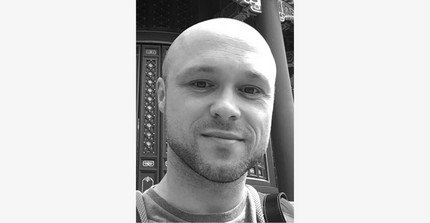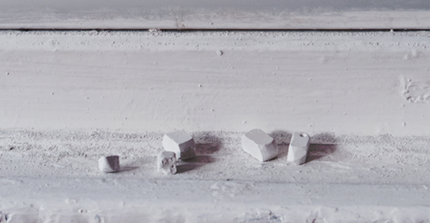Stefan Koch
What did you study?
After completing my basic military service in 2003, I started studying political science and history for a higher teaching post at the University of Leipzig. This also included the subjects of education, including educational psychology and general didactics. In addition, I had to do my Latinum in order to be able to teach history in high school.
How did you get into your job?
In the 12th grade we had the opportunity at our school to attend study information days at universities. I subsequently attended the information day at the University of Leipzig with some of my classmates. Since I really liked the city and the university, it was clear to me that I wanted to study there. I didn't have a specific subject or course in mind yet. When I graduated from high school, it was clear to me that it should be history and politics. So it came about that I registered for these two subjects in combination with the teaching profession. My motivation behind it was that I really wanted to immerse myself in the world of work after graduation. In addition, my teachers were role models for me, so that I could well imagine this profession for myself. So I studied until 2008, then went to North Rhine-Westphalia for my legal clerkship and then moved to Lower Saxony after my legal clerkship.
What were the last three things you did at or for work?
Most recently, I was accompanying a colleague with an 11th-grade class in Berlin on a study trip. Here, of course, I primarily helped to organize the individual program items and took on the supervision of the group.
After the trip, planning the new school week was on the agenda at the weekend, especially the detailed planning for my advanced political course. On the first day after the trip, normal school life started. The main focus here was on discussions with my core group (8th grade), organizing a school hike, and teaching in a basic political course.
Which subjects do you teach?
I mainly teach my studied subjects: politics / economics and history. Since I work at an IGS, the subjects history, politics and geography are combined in one subject (social studies) in lower secondary level. To do this, I also have to impart basic geography skills. However, since you sometimes teach subjects in everyday school life in which you are not trained, I also teach ethics in the 11th grade as well as work theory and consumer education in the 8th grade.
Did you like going to school?
I loved going to school, actually. Otherwise I would probably not have chosen this professional path either.
What new things did you learn as a teacher (at school)?
Above all, I learned that not only imparting knowledge and didactic processing of topics are part of everyday life. You have to invest a lot of time in the organization of everyday school life (discussions with parents, discussions with pupils, trips, specialist conferences, advanced training). I also noticed that school is also very much characterized by improvisation. Often lessons or project work do not work out as desired. Spontaneous creativity and quick solutions are required here. Dealing with colleagues and students is also completely different from what one is used to as a student or trainee teacher. You get a completely different insight into the world of school and you have to find your position again here.
What is important to you to teach?
Ich sehe meine Aufgabe nicht nur darin, den Schüler*innen Wissen zu vermitteln, um sie auf einen Abschluss vorzubereiten. Vielmehr bin ich in der Position, die Schüler*innen auf das Leben vorzubereiten. Dazu gehört es auch, Grenzen aufzuzeigen (geistige, wie physische) oder neue Horizonte zu eröffnen. Ich möchte, dass meine Schüler*innen sich in der Gesellschaft zurechtfinden und möglichst das Beste aus ihrem Leben machen. Sie sollen sich mit der bunten, weltoffenen Gesellschaft kritisch auseinandersetzen können. Dabei sollen ihre Leitlinien Toleranz, Respekt, Frieden, Freiheit und Demokratie sein.
What challenges you about your job?
The biggest challenge is that every day is actually different. It is true that you plan your lessons and structure the teaching days, but suddenly everything can turn out differently: lessons are canceled, the students do not participate as planned, there is a lack of working material and and and.
In addition, the daily educational task is very challenging, especially in secondary level I. Especially at the IGS, where various students with different requirements are taught. Another positive challenge is that I always stay up to date, especially in the subject of politics, and that I have to continue my education in the various key topics.
"I don't just see my task as conveying knowledge to the students,
to prepare them for a graduation.
Rather, I am in a position to prepare the students for life."
What is important for you to teach?
I don't just see my task as conveying knowledge to the students, to prepare them for a graduation. Rather, I am in a position to prepare the students for life. This includes also pointing out boundaries (intellectual, as well as physical) or opening up new horizons. I want my students to be able to navigate in society and make the most of their lives. They should be able to critically engage with the diverse, open-minded society. Their guiding principles should be tolerance, respect, peace, freedom and democracy.
What challenges does your job pose?
The greatest challenge is probably that every day is different. Although one plans the lessons and structures the school days, it can suddenly all change: a lesson is cancelled, the students don't respond as planned, there is a lack of materials and so on. Furthermore, the daily educational task is also very challenging, especially in secondary education I. Just at the IGS, where students with different backgrounds and abilities are taught. Another positive challenge is that I always have to stay up-to-date in the subject of politics and further develop my knowledge in the various focus areas.
Your tips for career starters?
I can only advise to get a clear picture of the tasks of a teacher during their studies. It is recommended to do internships at schools before or during their studies. Here, one can have conversations with the teachers on site and also get to know the daily work at different types of schools. Also, the different employment conditions (and thus also the salaries) in the federal states should be looked at more closely.
Thank you for the exciting insights into the teaching profession, Stefan Seidler!
The written interview was conducted in March 2017.


